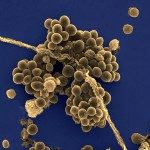Link to Pubmed [PMID] – 11724835
J. Clin. Microbiol. 2001 Dec;39(12):4296-301
Simple PCR and sequencing assays that utilize a single pair of degenerate primers were used to characterize a 429-bp-long DNA fragment internal (sodA(int)) to the sodA gene encoding the manganese-dependent superoxide dismutase in 40 coagulase-negative staphylococcal (CNS) type strains. The topology of the phylogenetic tree obtained was in general agreement with that which was inferred from an analysis of their 16S rRNA or hsp60 gene sequences. Sequence analysis revealed that the staphylococcal sodA genes exhibit a higher divergence than does the corresponding 16S ribosomal DNA. These results confirm that the sodA gene constitutes a highly discriminative target sequence for differentiating closely related bacterial species. Clinical isolates that could not be identified at the species level by phenotypical tests were identified by use of this database. These results demonstrate the usefulness of this method for rapid and accurate species identification of CNS isolates, although it does not allow discrimination of subspecies. The sodA sequence polymorphisms observed with staphylococcal species offer good opportunities for the development of assays based on DNA chip technologies.

